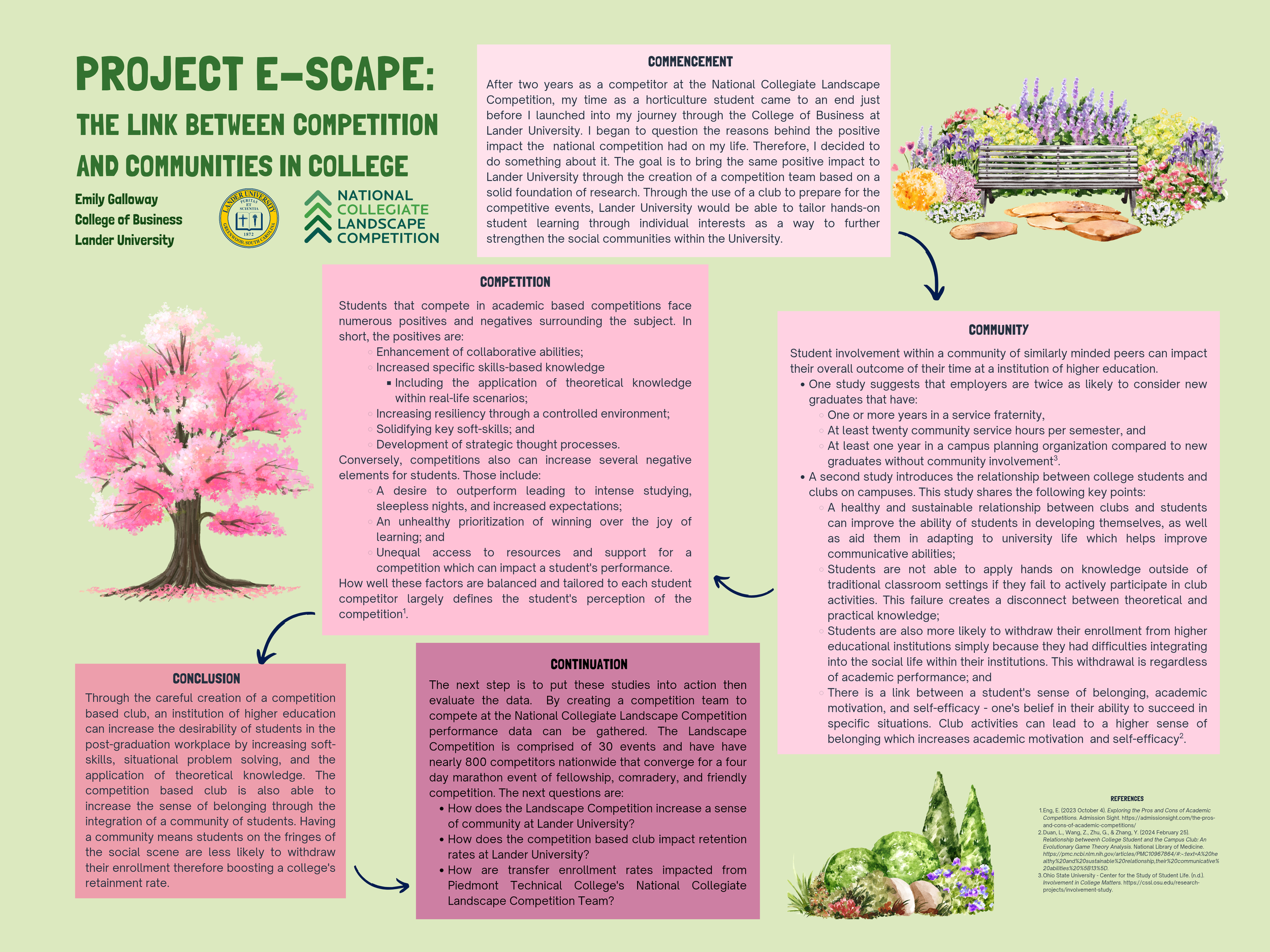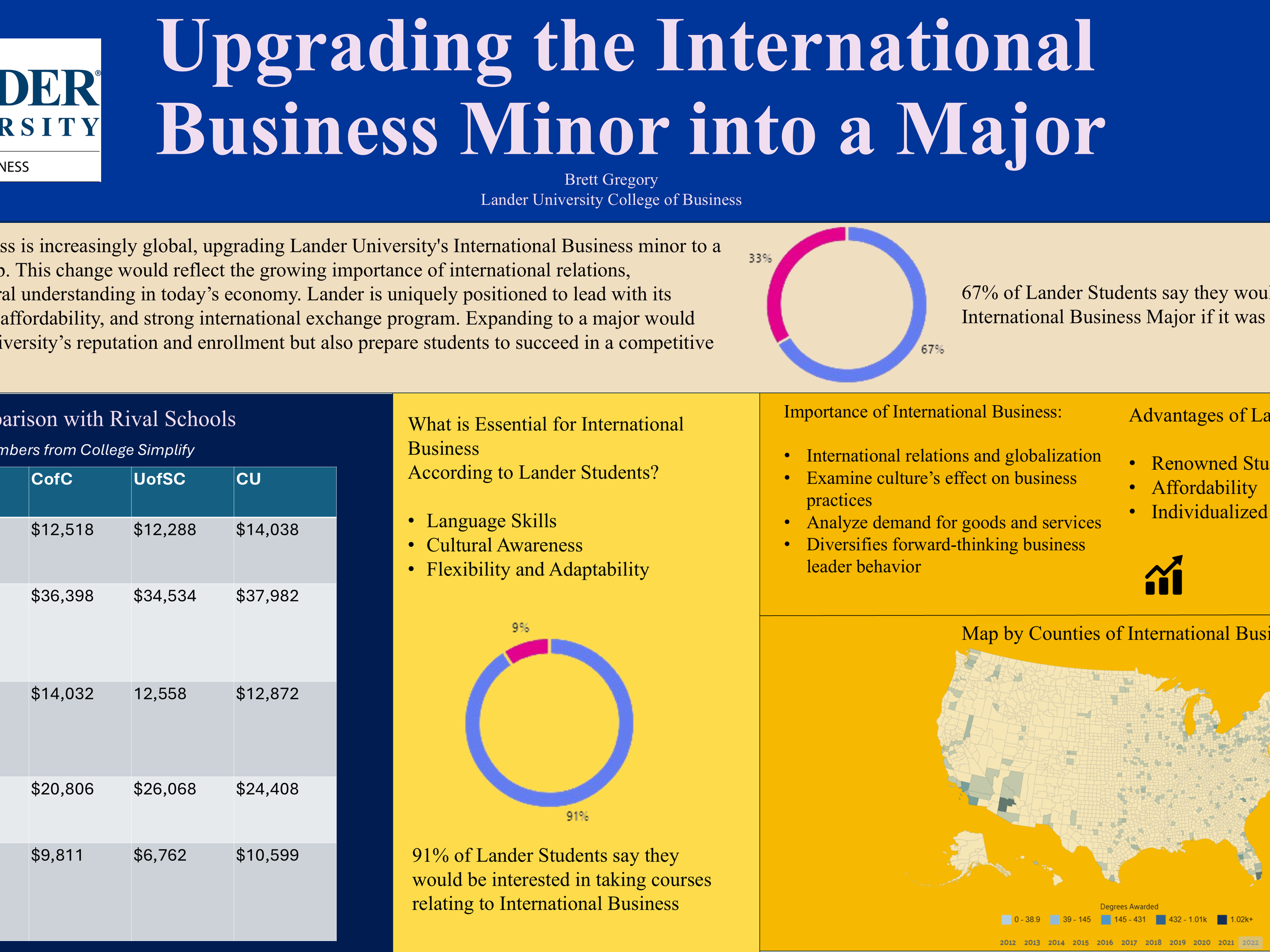Multidisciplinary Poster Session -
Business & Interdisciplinary Studies
held on April 24, 2025 at the Lander University Academic Symposium
Faculty Sponsors: Lillian Craton - MaryKate Leggieri - Matthew Peters - Cherie Rains
Presenters: Emily Galloway - Brett Gregory - Hannah Owens - Olandria Payne
Scroll to view all projects!
-
![]()
Emily Galloway
Click here to see the poster in more detail.
Project E-Scape: The Link Between Competitions and Communities in College
After two years as a competitor at the National Collegiate Landscape Competition, my time as a horticulture student came to an end just before I began my journey through the College of Business at Lander University. I began to question the reasons behind the positive impact the national competition had on my life. Therefore, I decided to do something about it. The purpose of this research is to understand the benefits behind competitions and how communities are formed through the rigorous preparation of competitive events. The goal is to bring the same positive impact to Lander University through the creation of a competition team based on a solid foundation of research. Meta analysis, a compilation of different sources, was the method through which the research was obtained. Competitions can push students to their maximum bandwidth while allowing students to have a platform to showcase their skills while developing strong resilience in the process. However, students are also able to become hyper-fixated on the competition in an unhealthy way. This attachment can lead to a neglect for academic learning and a subtraction from the joys of learning. Additionally, research suggests that employers value students post-graduation to be highly-involved over their uninvolved counterparts. When conducted properly, competitions in college provide learning opportunities that are outside the scope of traditional lectures. These opportunities allow students to be more prepared for life after college. Using a club to prepare for the competitive events, Lander University would be able to tailor hands-on student learning through individual interests to further strengthen the social communities within the University.
Emily Galloway is a senior in Lander University’s College of Business. In May 2024 she obtained her Associate’s Degree in Horticulture Technology from Piedmont Technical College. Her goal is to take her passion for management and blend it with her love for horticulture to make a positive impact as a leader within the landscaping industry after graduation.
-
![]()
Brett Gregory
Click here to see the poster in more detail.
Growing Horizons: The Case for Adding an International Business Major
This paper offers an argument to upgrade the Lander University International Business minor into a major because of how interconnected the world has become in business. The major arguments will include the main points as to why International Business is so important, such as international relations, globalization, and the impact of culture on business practices. An analysis of rival schools and comparing them to Lander University showcases Lander's advantages, including individualized education, affordability, and a renowned international exchange program. The addition of an International Business major can increase enrollment, foster international partnerships, and enhance Lander's reputation. This investment in this major can effectively prepare students for the complexity of a global marketplace, and foster a rich and cultural academic community, while better equipping students for the international job market.
Brett Gregory is a double major in Business Administration major with a concentration in Management and Marketing as well as Political Science with minors in International Business and Pre-Law. He is a member of Lander University's Honors College, Student Government, The National Society of Leadership and Success, and the Student Advisory Board for the College of Business
-
![]()
Hannah Owens
Click here to see the poster in more detail.
The Spectrum of Influence: How Product Packaging Shapes Branding, Consumer Behavior, and Purchasing Decisions Across Age Groups
Consumers encounter thousands of advertisements daily, influencing their perceptions and purchasing behaviors. While brand familiarity plays a role, certain products stand out due to design elements such as color, typography, and packaging structure. This study examines the role of product packaging in consumer decision-making across different age groups. The research was conducted using an online survey, with participants aged 13 and older. The survey included a range of required questions in short answer, multiple-choice, and scaled response formats (1-5). Participants were shown images of three different product groups—energy drinks, peanut butter, and chocolate bars—each featuring a minimum of three brands. After viewing the packaging, they provided feedback on their emotions, preferences, and perceptions of the products. Findings indicate that color, imagery, visibility, and material quality significantly influence consumer choices. While bright colors and engaging designs attract attention, consumers also value clear product information and high-quality packaging materials. Older participants prioritized readability and product details, while younger respondents favored eye-catching and nostalgic designs. Additionally, perceptions of sustainability and material quality shaped judgments about a product’s overall value. This research contributes to branding and market strategy by addressing the key question: To what extent does product packaging influence a consumer’s decision to purchase an item?
-
![]()
Olandria Payne
Click here to see the poster in more detail.
The Transition to Value-Based Care: Financial Implications for Healthcare Organizations and Administrators
This project will define value-based care (VBC) and explain its significance by drawing from published research, policy statements from organizations like the Centers for Medicare & Medicaid Services (CMS), and case studies from healthcare institutions that have transitioned from fee-for-service models. By analyzing financial data, patient outcome reports, and industry trends, this research highlights the benefits and challenges of VBC implementation. The findings suggest that value-based care improves healthcare efficiency, reduces costs, and enhances patient satisfaction, making it a model that more hospital systems should explore.
Olandria Payne graduated from Clinton High School and is a senior Business Administration major with an emphasis in healthcare management. An Honors College student and Dean’s List recipient, Olandria has completed an internship at CVS and presented research on healthcare management.



